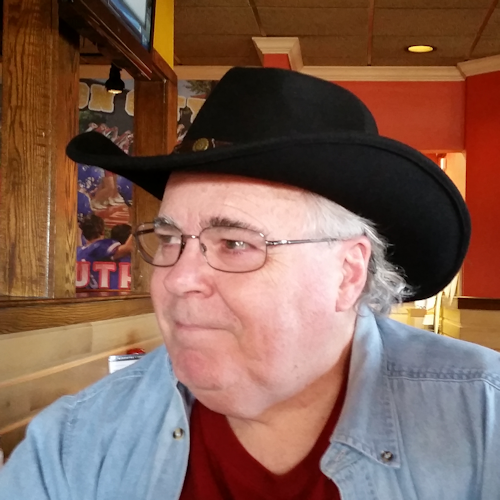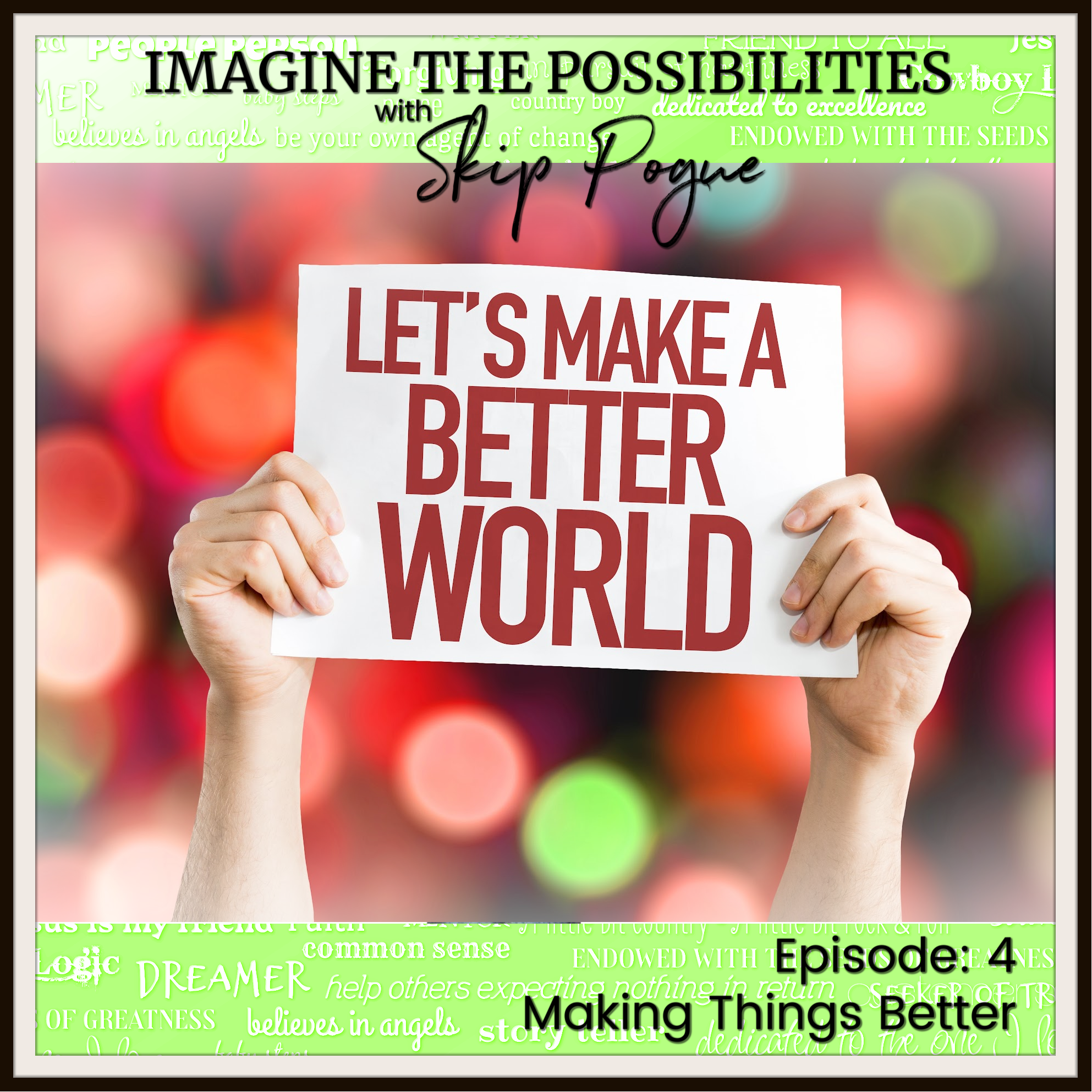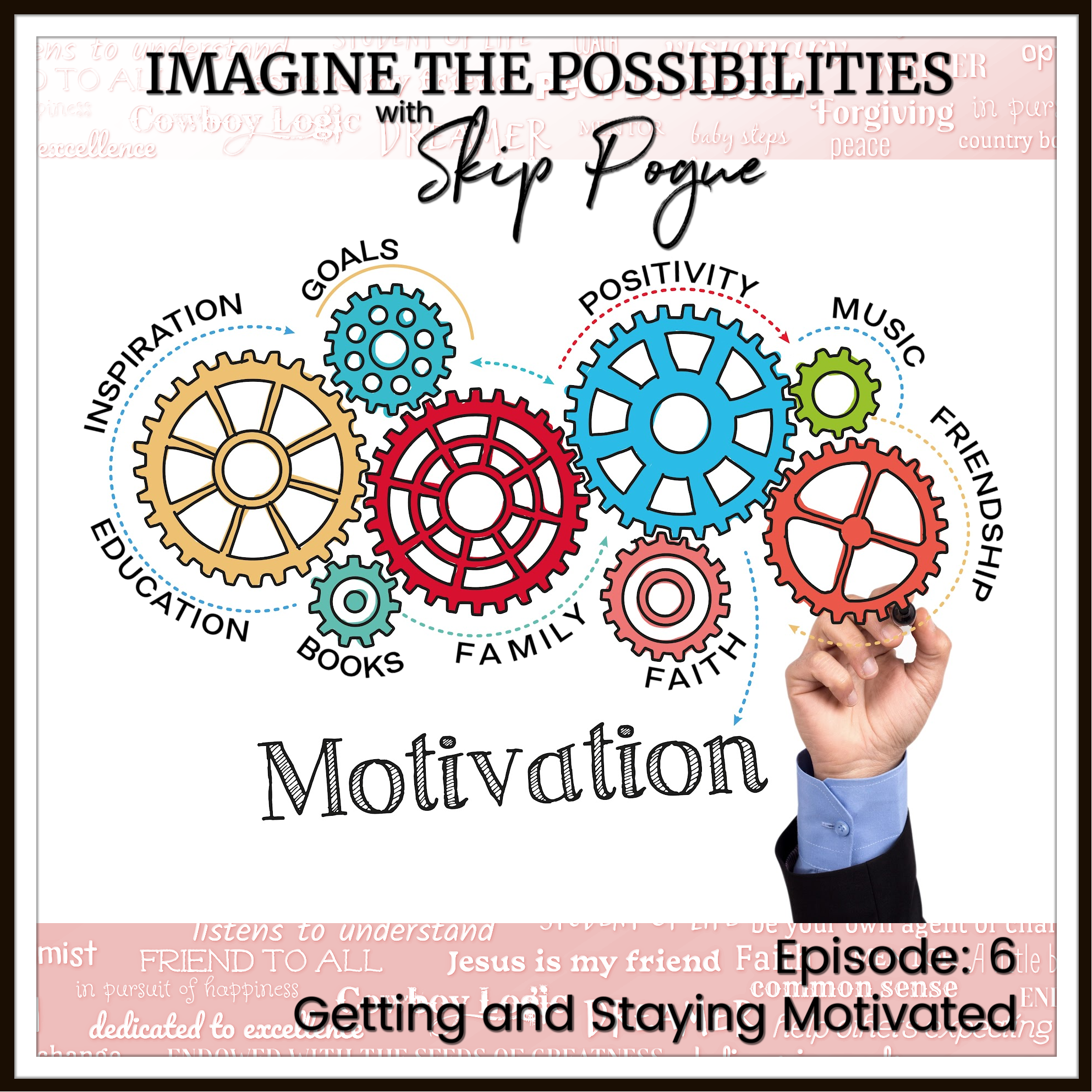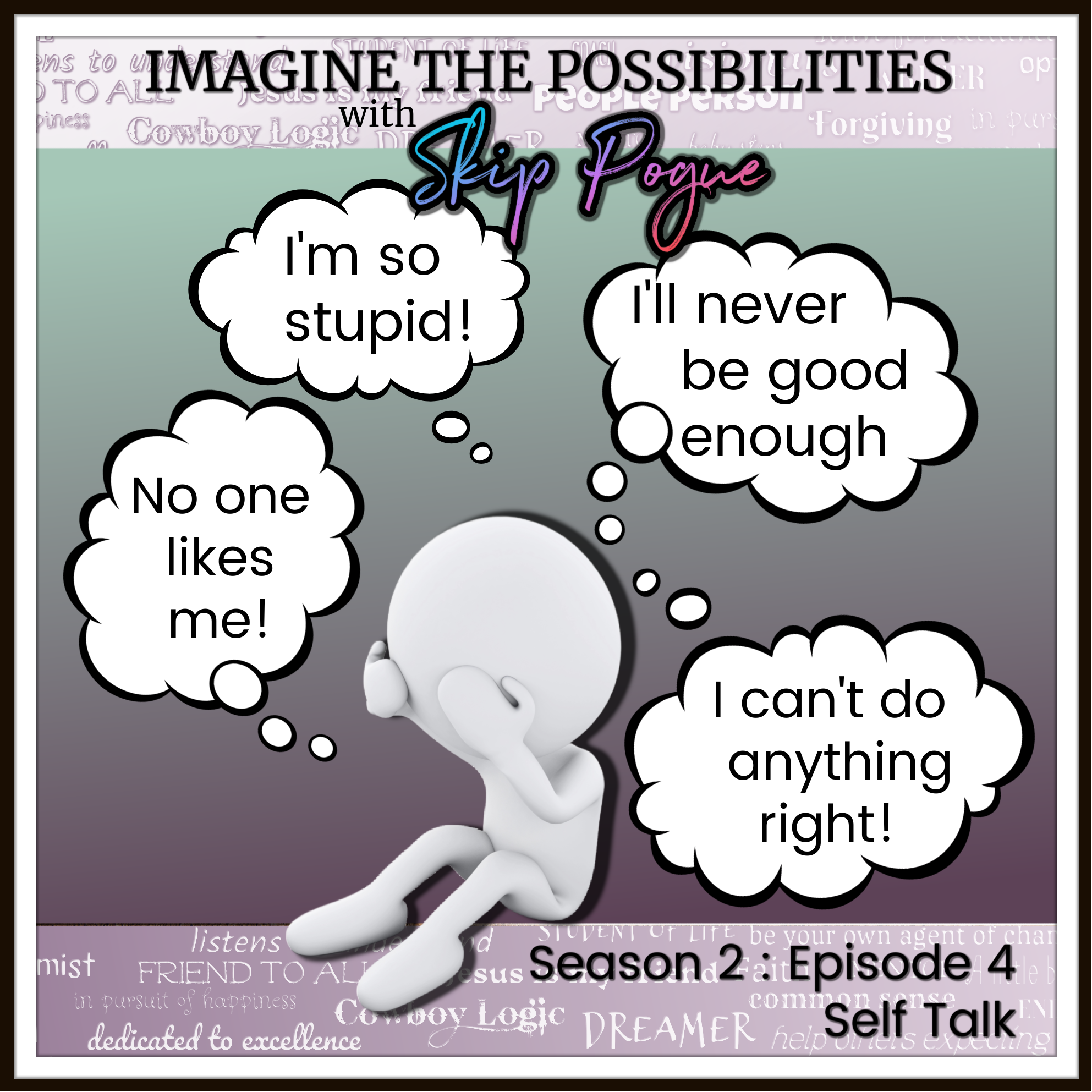In this episode, “Do Overs”, we will be exploring the fear of failure and its impact on our lives. I’ll be sharing my personal journey of overcoming this fear, recounting my experiences at IBM and the mentorship that changed my perspective. I’ll be highlighting the power of perseverance and the concept of "do overs," all the while emphasizing that failure is just a steppingstone to success. Join me as I discuss ways to embrace failure, learn from it, and keep moving forward toward your goals. Let's “Imagine the Possibilities together.”
View Full Transcript
Episode Transcript
[00:00:03] Hello and welcome to imagine the possibilities. My name is Skip Pogue. This episode is titled Do Overs.
[00:00:14] Before I get started, I'd like to ask you a couple questions. Do you fear failing?
[00:00:21] Has the fear of failing prevented you from moving forward in your personal, professional, or spiritual life?
[00:00:27] Does the fear of failing keep you from enjoying your life to the fullest?
[00:00:33] I'm not sure how you answered these questions, but I can tell you there was a time that I answered all three of them. Yes.
[00:00:41] So this is an opportunity for you to walk with me on my journey of no longer fearing failure and moving toward the point of embracing failure.
[00:00:53] Here's my deal.
[00:00:55] During the early years as an adult, I somehow developed a fear of the unknown.
[00:01:02] I was uncomfortable doing anything that I didn't know how to do 100%. I passed on opportunities because of not believing I would be successful. If I didn't know something and felt I couldn't learn it quickly, I made no attempt to even try.
[00:01:18] This affected both my personal and professional life.
[00:01:23] At this point, I was about halfway through my career with IBM and had just finished a seven year stint as a customer engineer.
[00:01:31] Me being a CE was, for the most part, successful. I received a fair amount of recognition in awards, including two IBM Means service awards, and I was selected as the IBM CE of the year. In my branch office, I also received several promotions. However, deep down I knew I could have done better if I was just willing to step out of my comfort zone.
[00:01:57] In 1981, IBM announced the personal computer. It seems that a manager I'd worked for and who was a friend of mine had a temporary assignment available that he had talked to my manager. My current manager about. It was in Boca Raton, Florida, providing technical support for the dealers who sold IBM PCs. As a result of this, I was given the opportunity to work in the new PC support center to see if I was a good fit. So I was off to Boca.
[00:02:31] This trial, it started out a bit tentative.
[00:02:34] Several other analysts seemed to know exactly what they were doing, and I came across as unsure of myself. However, I was about to get some unexpected help and encouragement. For me, everything was about to change. This change was not because of some cataclysmic event, but because of a manager that decided I was worth keeping.
[00:02:55] At the end of the second week, this manager asked me to stay and chat with him after work.
[00:03:02] I really felt that this was a terrific opportunity and I really did want the job.
[00:03:08] However, my first thoughts about our chat was that he was going to tell me that he didn't feel I was a good fit and that I could head home as soon as I could get a flight.
[00:03:23] Instead, he told me that he felt like I'd be an asset to the support center. He told me that he felt I could learn the things I needed to if I would simply apply myself and the skills that I already had.
[00:03:35] I didn't see that coming.
[00:03:38] Anyway, we spent several hours that evening just talking. The manager's name was Bob, and for some reason, our chat soon became like two old friends talking shop. I told him about my fear of failing. I explained that oftentimes I would find myself in a state of despair because of it, that it affected me both physically and emotionally. I also told him that at times I would internalize it to the point that I felt physically sick. At other times, it paralyzed every fiber of my being, that it was as if I was stuck and I couldn't move. I couldn't move forward.
[00:04:18] We spent a bit of time with him asking me where I saw myself in five and ten years, and I talked about the different things I felt I wanted to do. I said maybe something in a leadership position and then maybe management after that. It was at this point that I realized that Bob was in no way judging me and that he really wanted to see me accomplish everything that I could in life. Bob really had not talked a lot, but he had listened to every word I said.
[00:04:48] As we were winding down our conversation, Bob looked at me and said something that surprised me.
[00:04:54] He said, I would like you to allow me to be your mentor.
[00:05:00] I was beyond shocked. He'd only known me for a few weeks. Why me? Why now?
[00:05:07] We talked about it a bit, and I told him, I'd like that. He got up, and we shook hands. As we were walking out of the building, Bob simply said, you can fix all this, and then encouraged me to think about it. Over the weekend, as we got in our respective cars, he said, have a great weekend, and we'll talk again soon. I said, thanks and good night.
[00:05:30] I had a whole weekend to think about it, and I spent a lot of time doing so.
[00:05:37] Anyway, I spent six months in Boca. Bob and I continued to have our conversations. At the end of my temporary assignment, I got a call from my field manager. He told me that within the hour I would be offered a job at the support center.
[00:05:52] A few minutes later, Bob called me in his office and gave me a copy of my offer. He also told me that my manager had already agreed to let me make the move. I accepted offer and would be moving to work with IBM PC company. He also made me aware that I'd be moving to Atlanta instead of Boca. It seemed they were going to split the center between the two locations.
[00:06:18] Over those six months, Bob and I probably talked two dozen or more times.
[00:06:23] Bob listened. He never told me how to do anything. Instead, he encouraged me to discover how to do it on my own.
[00:06:32] Probably my biggest discovery during this time revolved around two concepts. The first was that I only failed if I quit trying, and the second is what I chose to call do overs were available as long as I was willing to keep trying. In one of those discussions, I told Bob what I figured out and what I was going to do moving forward. His reply was a smile and the word great.
[00:07:02] As I moved forward on my life's journey, Bob continued to mentor me. Besides being my mentor, as time passed, Bob became one of my best friends. He continued to mentor me throughout the rest of my ABM career and even did so after I retired and went to work for another company. I wound up becoming a manager and later a director at the second company I worked for. I figured out a lot of things with Bob's guidance. Two things I learned with Bob's help always stood out in my mind. One was about leadership and how you should treat those that follow you. The other was how to embrace failure and what you learn from each time it happened here is, as Paul Harvey used to say the rest of the story.
[00:07:52] One night while having dinner with a group of friends, one of them said, there's no such thing as do overs in life. No one said anything to them and we just moved on to the next topic. However, the next morning, as I sat on the patio drinking a cup of coffee, I started thinking about what was said. The first thing I realized was to say that there is no do overs in life is simply not true. The fact is that without do overs, many of us would never have been able to be successful at much of anything.
[00:08:25] I know that I had many opportunities to do things over. Almost without exception, I discovered in both my professional life and my personal life that each time I took a do over, it truly put me on a pathway to success.
[00:08:41] As I thought about this more, I realized that many of the people that I thought were successful in their field of endeavor failed. Actually, some failed multiple times, and each time they simply took a do over and tried again.
[00:08:56] Let's take a look at a couple of them and what happened and how it all ended up because they were willing to keep on keeping on.
[00:09:08] One of my favorite authors, Theodore Geisel, better known as Doctor Seuss was rejected more than 20 times before his first book was published.
[00:09:19] When it was all said and done, his books had been translated into more than 20 languages, and he sold over 600 million copies.
[00:09:30] When Thomas Edison was asked about inventing the light bulb, he said, I have not failed. I've just found 10,000 ways that will not work. Oh, and one of Edison's teachers told him he was too stupid to learn anything. Sure glad he persisted and created a light bulb. Otherwise I might be recording this in the dark.
[00:09:53] Henry Ford went broke five times before he succeeded. Walt Disney was fired from a newspaper for not being creative enough. Jim Denny, the manager of the Grand Ole Opry, told Elvis after his one and only appearance that he should just go back to Memphis and continue to be a truck driver.
[00:10:12] In high school, Michael Jordan didn't make the varsity team the first time he tried out anyway. I think you can see that a lot of successful people appear to be failures at some point in their life.
[00:10:25] The thing is that life does allow do overs, and it's of the utmost importance that we take full advantage of them. Chances are, as we try to do new things, develop new ideas, or whatever we try, we will most likely fail. At times.
[00:10:41] When we think about it, it should be intuitively obvious to even the most casual observer that in many cases, failure is inevitable. The real issue is not that we fail. The issue is what we do when we fail. By now, you should understand the answer. Simple. You take a do over and try again. By doing so, you can change what you perceived as a failure and turn it into a lesson learned, a bit of invaluable experience, if you will, for that's truly what it is.
[00:11:12] My point in all this is quite simple. You need to use do overs. You only fail if you quit, if you stay down, if you give up, if you don't, try again, if you get up and try again, you can apply what you learned and do better the second time, and the third time, and the fourth time. And for however many times it takes you to succeed.
[00:11:33] The fact is that you cannot change what has happened. But you sure can change what will happen. Don't quit. Keep trying. Be persistent. Success is out there for everyone.
[00:11:48] Here are three of my favorite quotes. I hope you'll remember them and think about them each day.
[00:11:54] You were designed for accomplishment, engineered for success, and endowed with the seeds of greatness. Zig Ziglar.
[00:12:04] And you will succeed. Yes, you will indeed. 98 and three 4% guaranteed, kid. You'll move mountains. Doctor seuss.
[00:12:16] Don't fear failure. Instead, embrace it, for being forged in the fiery furnace of failure will only make you stronger. Skip Pogue as I said earlier, I no longer fear failure. I now recognize it as simply being part of the process to move forward. I can now embrace it with the realization that I can overcome it. I discovered that do overs are truly part of the pathway to success.
[00:12:49] I need to tell you this. I've always believed that the only way I can be successful is if I help all those around me be successful. I want to see each of you be successful in what you want for your life. I want to see you accomplish what you want to accomplish. I do believe that it's important that each of you understand that your success should be measured against your own goals and aspirations, not those that others want to apply to you.
[00:13:17] When you get a bit of time, head over to imagine impossibilities life you might want to take a couple minutes and read. I want to talk about me.
[00:13:28] You can listen to my current past podcast. You'll also find transcripts of each podcast. Anyway, check it all out. Oh, and you can leave me questions or comments. You can make suggestions, or let me know if there's something you might like me to address moving forward.
[00:13:46] Thanks for your time.
[00:13:48] I deeply appreciate you taking the time to listen to this. Hopefully you found a nugget or two that will help you as you move forward in your life. This is my goal in doing this podcast.
[00:14:00] Always remember that your future belongs to you. Stay humble, be kind, love deeply, and laugh often. I hope that you have a super day and pray that God blesses you in a super way.
[00:14:14] Thanks again.






